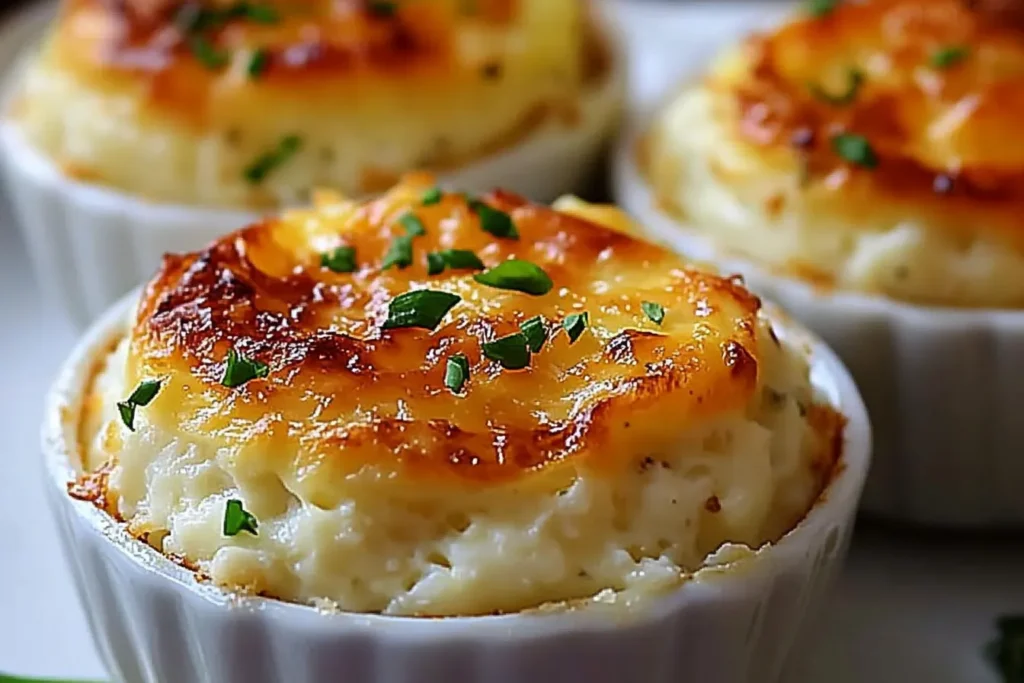Table of Contents
Baked Cottage Cheese Eggs are a delightful and nutritious way to start your day or enjoy a light meal.
Introduction
Baked Cottage Cheese Eggs offer a unique twist on traditional egg dishes. This recipe combines the creamy texture of cottage cheese with the protein-packed goodness of eggs. The result is a flavorful and satisfying dish that is surprisingly easy to make. This method unlocks a secret to achieving fluffy, flavorful, and healthy eggs.
The Power of Cottage Cheese in Baked Eggs
Cottage cheese adds moisture and richness to baked eggs, preventing them from becoming dry or rubbery. Its mild flavor complements the taste of eggs beautifully, creating a harmonious blend. Furthermore, cottage cheese is a great source of protein and calcium, enhancing the nutritional value of this already healthy dish.
Enhanced Texture and Flavor
The addition of cottage cheese transforms the texture of baked eggs. It creates a creamy, almost custard-like consistency that is incredibly appealing. The subtle tanginess of cottage cheese also adds a layer of complexity to the flavor, making it more interesting than plain baked eggs.
Nutritional Advantages
Cottage cheese is packed with protein, which is essential for muscle building and repair. It also contains calcium, which is crucial for bone health. By incorporating cottage cheese into your baked eggs, you are boosting the nutritional content of your meal. Enjoy a guilt-free indulgence that’s good for you.
Versatility and Customization
Baked Cottage Cheese Eggs are incredibly versatile. You can easily customize the recipe to suit your taste preferences by adding various ingredients. Some popular additions include vegetables, herbs, spices, and cheese. This recipe adapts to any flavor profile.

Essential Ingredients for Perfect Baked Cottage Cheese Eggs
To make the perfect Baked Cottage Cheese Eggs, you need a few key ingredients. High-quality eggs, creamy cottage cheese, and your choice of seasonings are essential. Consider adding vegetables or cheese for extra flavor and texture. A good recipe starts with good ingredients.
Selecting the Right Eggs
Choose fresh, high-quality eggs for the best results. Organic or free-range eggs often have richer flavor and a more vibrant yolk color. Ensure the eggs are properly stored and within their expiration date. Fresh eggs make a noticeable difference.
Choosing the Best Cottage Cheese
Opt for full-fat or low-fat cottage cheese depending on your preference. Full-fat cottage cheese will provide a richer, creamier texture, while low-fat cottage cheese will reduce the calorie content. Small curd or large curd cottage cheese can be used, based on your desired consistency.
Seasoning and Flavor Enhancements
Experiment with different seasonings to enhance the flavor of your Baked Cottage Cheese Eggs. Salt, pepper, garlic powder, onion powder, and paprika are all great options. Fresh herbs like chives, parsley, or dill can also add a burst of freshness. Don’t be afraid to get creative with your spices.
Step-by-Step Guide to Baking Cottage Cheese Eggs
Baking Cottage Cheese Eggs is a simple process that requires minimal effort. Begin by preheating your oven and preparing your baking dish. Then, combine the eggs, cottage cheese, and seasonings in a bowl and pour the mixture into the dish. Bake until the eggs are set and slightly golden brown. Enjoy a foolproof recipe for delicious results.
Preparing the Baking Dish
Grease your baking dish with butter or cooking spray to prevent the eggs from sticking. You can use a variety of baking dishes, such as a pie plate, casserole dish, or muffin tin. Ensure the dish is oven-safe and appropriately sized for the amount of eggs you are using. A well-prepared dish ensures even cooking.
Mixing the Ingredients
In a bowl, whisk together the eggs, cottage cheese, and seasonings until well combined. Avoid overmixing, as this can result in tough eggs. The mixture should be smooth and creamy.
Baking to Perfection
Pour the egg mixture into the prepared baking dish and bake in a preheated oven at 350°F (175°C) for 20-25 minutes, or until the eggs are set and slightly golden brown. The baking time may vary depending on your oven and the size of your baking dish. Keep an eye on the eggs to prevent overcooking.

Mastering the Art of Baking Cottage Cheese Eggs: Tips and Tricks
To achieve the best results when baking Cottage Cheese Eggs, consider these helpful tips and tricks. From preventing watery eggs to adding extra flavor, these techniques will help you master this versatile dish. Small changes can make a big difference.
Preventing Watery Eggs
To prevent your Baked Cottage Cheese Eggs from becoming watery, be sure to drain any excess liquid from the cottage cheese before adding it to the egg mixture. You can also add a tablespoon of flour or cornstarch to the mixture to help absorb excess moisture. Proper preparation minimizes wateriness.
Achieving the Perfect Texture
For a creamier texture, use full-fat cottage cheese and avoid overbaking the eggs. If you prefer a firmer texture, use low-fat cottage cheese and bake the eggs for a slightly longer time. Adjusting ingredients and baking time allows for texture control.
Adding Extra Flavor and Nutrients
Incorporate vegetables such as spinach, mushrooms, or bell peppers to add extra flavor and nutrients to your Baked Cottage Cheese Eggs. Cheese like cheddar, mozzarella, or Parmesan can also add richness and flavor. Get creative and experiment with different combinations.
Variations and Adaptations of Baked Cottage Cheese Eggs
The possibilities are endless when it comes to variations of Baked Cottage Cheese Eggs. Consider adding different vegetables, cheeses, meats, or spices to create your own unique flavor combinations. This recipe adapts to any taste.
Vegetarian Options
For a vegetarian version, add vegetables like spinach, mushrooms, onions, and peppers. Cheese like feta or mozzarella also makes a great addition. Incorporating plant-based ingredients creates a delicious vegetarian dish.
Meat Lovers’ Delight
Add cooked bacon, sausage, or ham for a protein-packed version of Baked Cottage Cheese Eggs. These additions will enhance the flavor and make the dish more satisfying.
Spicy Kick
Add a pinch of red pepper flakes or a dash of hot sauce to give your Baked Cottage Cheese Eggs a spicy kick. Jalapeños or other hot peppers can also be added for extra heat. Adjust the spice level to your preference.
Health Benefits of Baked Cottage Cheese Eggs
Baked Cottage Cheese Eggs are a healthy and nutritious meal option. They are high in protein, calcium, and essential vitamins. This dish is also relatively low in calories and carbohydrates, making it a great choice for those watching their weight. Enjoy a meal that is both delicious and good for you.
High in Protein
Eggs and cottage cheese are excellent sources of protein, which is essential for building and repairing tissues, supporting immune function, and promoting satiety. A high-protein meal can help you feel full and satisfied for longer.
Rich in Calcium
Cottage cheese is a good source of calcium, which is crucial for maintaining strong bones and teeth. Calcium also plays a role in muscle function, nerve transmission, and blood clotting.
Low in Calories and Carbohydrates
Baked Cottage Cheese Eggs are relatively low in calories and carbohydrates, making them a great option for those looking to lose weight or manage their blood sugar levels.
Common Mistakes to Avoid When Baking Cottage Cheese Eggs
Even though baking Cottage Cheese Eggs is a simple process, there are a few common mistakes to avoid. Overbaking, using too much liquid, and not seasoning properly are all common pitfalls. Steer clear of these mistakes for optimal results.
Overbaking the Eggs
Overbaking can result in dry, rubbery eggs. To prevent this, monitor the eggs closely and remove them from the oven when they are set but still slightly moist. Baking time varies depending on your oven, so adjust accordingly.
Using Too Much Liquid
Adding too much liquid to the egg mixture can result in watery eggs. Be sure to drain any excess liquid from the cottage cheese before adding it to the mixture. You can also add a thickening agent like flour or cornstarch.
Neglecting Seasoning
Seasoning is key to enhancing the flavor of Baked Cottage Cheese Eggs. Don’t be afraid to experiment with different spices and herbs to find your favorite flavor combinations. A little seasoning goes a long way.

Baked Cottage Cheese Eggs: A Versatile Meal for Any Time of Day
Baked Cottage Cheese Eggs are not just for breakfast. They can be enjoyed as a light lunch, a satisfying dinner, or a healthy snack. This versatile dish is perfect for any occasion. Embrace a meal that adapts to your lifestyle.
Breakfast Delight
Start your day with a protein-packed and delicious Baked Cottage Cheese Eggs. This will provide you with sustained energy and help you stay full until lunchtime.
Lunchtime Treat
Enjoy a light and healthy lunch with Baked Cottage Cheese Eggs. Add a side salad or some whole-grain bread for a complete meal.
Dinner Option
Serve Baked Cottage Cheese Eggs as a simple and satisfying dinner. Add some roasted vegetables or a side of quinoa for a more substantial meal.
FAQ
Why add cottage cheese to eggs?
Cottage cheese adds moisture, richness, and a creamy texture to eggs. It also boosts the protein and calcium content, enhancing the nutritional value of the dish.
Does cottage cheese melt when you bake it?
Cottage cheese does not fully melt when baked. It softens and becomes creamier, but it retains some of its original texture.
Can you cook with cottage cheese in the oven?
Yes, you can cook with cottage cheese in the oven. It works well in baked dishes like casseroles, lasagnas, and egg bakes, adding moisture and flavor.
Why are my cottage cheese eggs so watery?
Cottage cheese eggs can be watery if you don’t drain excess liquid from the cottage cheese. Also, overmixing or adding too many watery vegetables can cause this.

